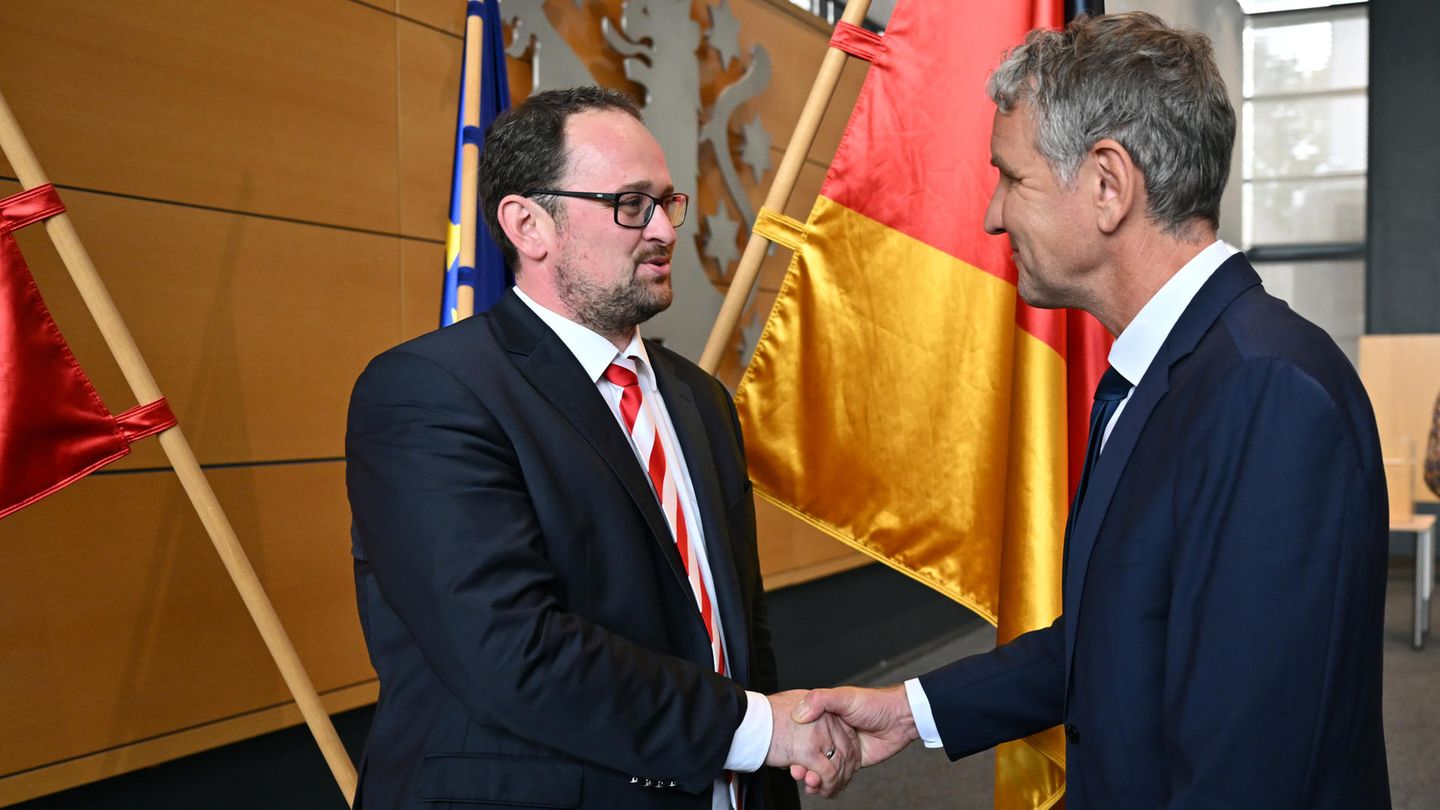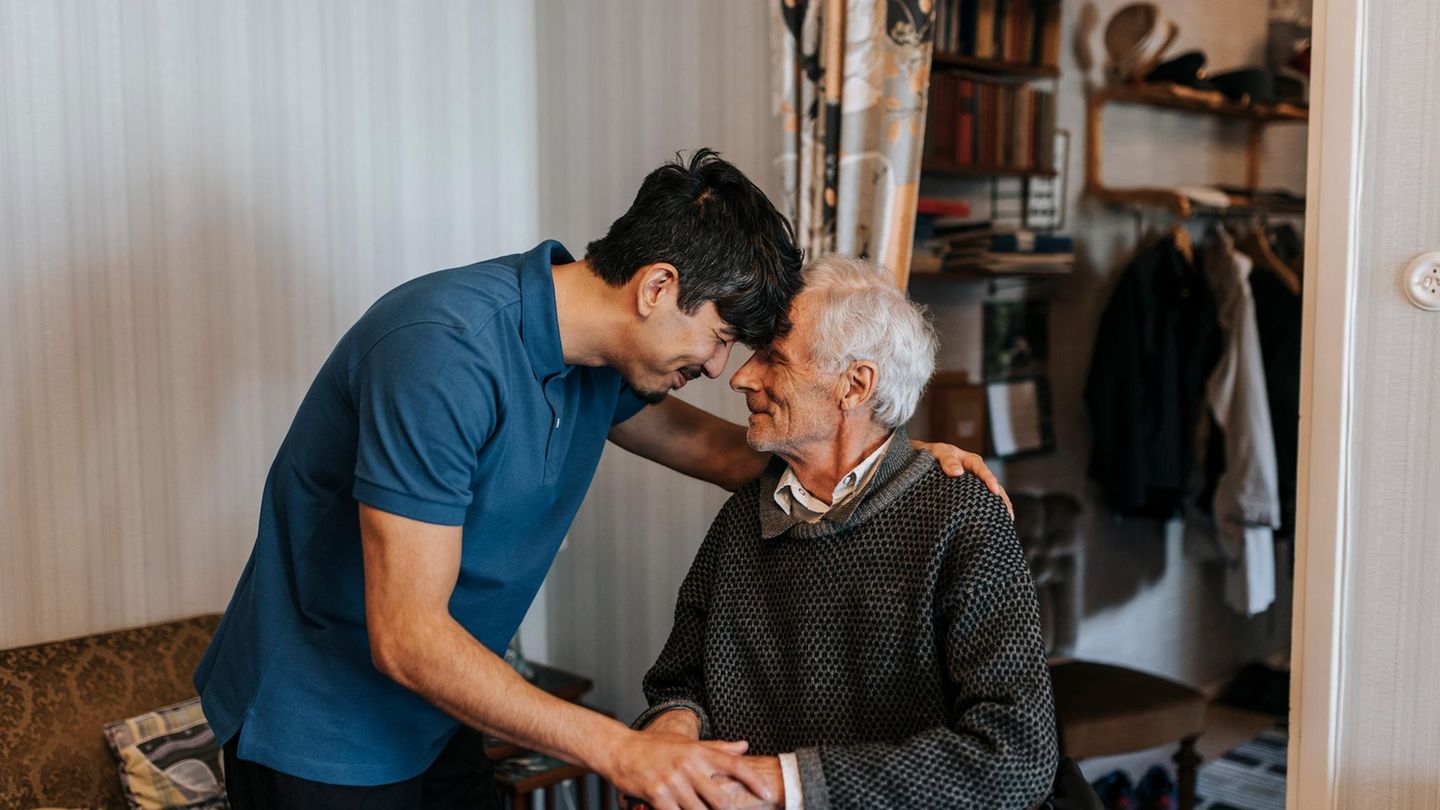No, the AfD did not conquer the Thuringian state parliament, the parliament elected a CDU president. But the path to get there was scandalous – and it wasn’t just the fault of the Höcke faction.
There he stands now, showered with bouquets of flowers and relieved: Thadäus König, 42 years old, holds a doctorate, Catholic, family man, CDU member, member of the state parliament – and since this Saturday, 10:46 a.m., President of the Thuringian Parliament.
He therefore holds the highest office in the country in terms of protocol. He manages the administration of the state parliament, heads the council of elders, invites people to meetings and will soon lead the election of a new prime minister. And he will represent Thuringia internally and externally.
So it is not a trivial position that King now holds. And it is good that it is not occupied by an AfD politician or even a convicted extremist.
Nevertheless, the reputation of the Thuringian parliament has been severely damaged in the past few days – first and foremost by the AfD, but also by the other factions. The ugly scenes from Thursday’s aborted meeting will resonate for a long time.
The state parliamentary group led by Björn Höcke had a clearly recognizable strategy. It read: If the majority of the state parliament is clearly not willing to elect the AfD candidate Wiebke Muhsal, as much political profit as possible should be made – and this at the expense of the other parties and the democratic institutions.
The aim was to strengthen the old victim narrative, of the poor, oh-so-democratic AfD being oppressed by a dictatorial party cartel – which, of course, disregards the true will of the people.
The means to an end for the AfD
Höcke had two means for this purpose. Firstly, the state parliament’s rules of procedure, which granted the largest parliamentary group, i.e. the AfD, the sole right to propose the president. And secondly, half by plan, half by luck, a party’s own senior president who should enforce the right to make nominations as far as possible.
The other factions had also prepared. Their means: the joint majority of 56 of the 88 representatives.
But the result, unfortunately, was a bad plan that was even worse executed. Instead of waiting until the election of the state parliament president in order to let the AfD candidate fail and to elect their own candidate in later rounds of elections – if necessary via an emergency order from the state constitutional court – they requested that the rules of procedure be changed in order to eliminate the AfD’s sole right to make proposals .
Tinkering with the rules wasn’t a good idea when it was discussed a few months ago. But at least the old parliament could have adjusted the rules of procedure in a legally secure manner and with all due calm. But now, right before the election?
Thuringian State Parliament: Greatest possible damage caused
This inadvertently confirmed the suspicion, consciously nurtured by the AfD, that a majority was violating a minority right that had always been respected, based on their own interests. And it gave the party the opportunity to cause as much damage as possible through its senior president.
The chaos that lasted several hours on Thursday further ruined the reputation of Thuringia and its state parliament. After the CDU and FDP blindly fell into the AfD’s trap in the winter of 2020 and, together with Höcke’s people, elected the liberal Thomas Kemmerich as Prime Minister, they allowed themselves to be paraded openly. It was unwise to repeatedly rudely interrupt the senior president’s speech, however unbearable the propaganda he spread was.
The only advantage was that the AfD showed its ugly, aggressive and destructive face even more clearly. The senior president, who holds a purely voluntary position without any legitimacy, behaved like a remote-controlled amateur tyrant. The AfD politicians who led him even stood next to him on the podium at times.
The self-empowerment of the senior president
The AfD went crazy – and thereby provided additional evidence for the Constitutional Court in Weimar, which, as expected, appealed to the CDU. The urgent decision that arrived late on Friday evening could no longer be a surprise.
The court ended the self-empowerment of the senior president and obliged him to let the parliament itself decide on its constitution process. The country’s highest constitutional body was sovereign again. New rules could be adopted by a majority and then a president could be elected by a majority.
Of course, the question of whether a parliament that has a quorum can already decide on its rules of procedure or whether it only has to be fully operational with the election of the president can still be debated. But the decision of the court in Weimar must be respected. On the one hand, it is well founded. On the other hand, this requires the democratic principle of separation of powers.
And Höcke congratulates
In the state parliament, the AfD behaved emphatically correctly on Saturday. The senior president carried out the instructions of the Constitutional Court and the election of the king was extremely civilized. At the end, Höcke congratulated the new president and the president shook his hand.
It was only to be expected that the AfD would still attack the court in public. As systematically as it undermines trust in postal voting, parliamentary procedures or administrative processes, it consistently fuels doubts about the rule of law.
The lesson from all this? The AfD cannot be fought away or regulated away. And by the way, it cannot be banned. This finding was already true when she was still significantly weaker. Now that it is the strongest faction in a state parliament and has the blocking minority in two state parliaments, it can no longer be ignored.
It would be wrong to allow a partly extremist party to participate in government power or to give it the leadership of a parliament. This would not disenchant it or even moderate it, but would only give it more opportunities to undermine the system.
The distinction therefore remains correct. But pure exclusion damages the reputation of democracy and ultimately only benefits the AfD. And it is difficult to maintain because of the blocking minority in Thuringia and Brandenburg, not to mention the municipalities.
Finding a new balance here will be the difficult task of the next few months. The primary election campaign for the Bundestag has already begun.
Source: Stern
I have been working in the news industry for over 6 years, first as a reporter and now as an editor. I have covered politics extensively, and my work has appeared in major newspapers and online news outlets around the world. In addition to my writing, I also contribute regularly to 24 Hours World.




